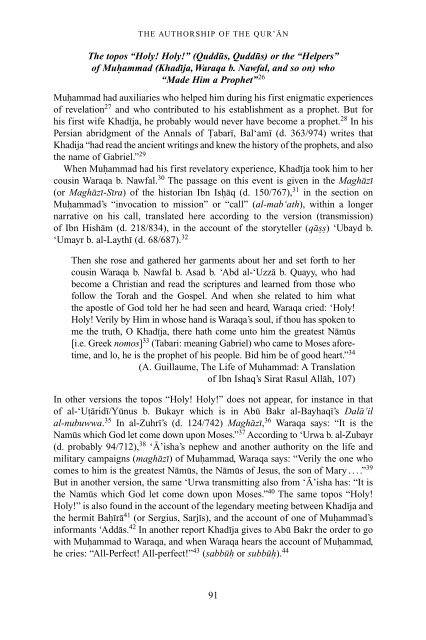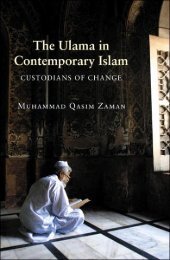The Qur'an in its historical context (pdf - Islam and Christian-Muslim ...
The Qur'an in its historical context (pdf - Islam and Christian-Muslim ...
The Qur'an in its historical context (pdf - Islam and Christian-Muslim ...
Create successful ePaper yourself
Turn your PDF publications into a flip-book with our unique Google optimized e-Paper software.
THE AUTHORSHIP OF THE QUR’AN<br />
<strong>The</strong> topos “Holy! Holy!” (Quddus, Quddus) or the “Helpers”<br />
of Muhammad (Khadija, Waraqa b. Nawfal, <strong>and</strong> so on) who<br />
“Made Him a Prophet” 26<br />
Muhammad had auxiliaries who helped him dur<strong>in</strong>g his first enigmatic experiences<br />
of revelation 27 <strong>and</strong> who contributed to his establishment as a prophet. But for<br />
his first wife Khadija, he probably would never have become a prophet. 28 In his<br />
Persian abridgment of the Annals of Tabari, Bal‘ami (d. 363/974) writes that<br />
Khadija “had read the ancient writ<strong>in</strong>gs <strong>and</strong> knew the history of the prophets, <strong>and</strong> also<br />
the name of Gabriel.” 29<br />
When Muhammad had his first revelatory experience, Khadija took him to her<br />
cous<strong>in</strong> Waraqa b. Nawfal. 30 <strong>The</strong> passage on this event is given <strong>in</strong> the Maghazi<br />
(or Maghazi-Sira) of the historian Ibn Ishaq (d. 150/767), 31 <strong>in</strong> the section on<br />
Muhammad’s “<strong>in</strong>vocation to mission” or “call” (al-mab‘ath), with<strong>in</strong> a longer<br />
narrative on his call, translated here accord<strong>in</strong>g to the version (transmission)<br />
of Ibn Hisham (d. 218/834), <strong>in</strong> the account of the storyteller (qass) ‘Ubayd b.<br />
‘Umayr b. al-Laythi (d. 68/687). 32<br />
<strong>The</strong>n she rose <strong>and</strong> gathered her garments about her <strong>and</strong> set forth to her<br />
cous<strong>in</strong> Waraqa b. Nawfal b. Asad b. ‘Abd al-‘Uzza b. Quayy, who had<br />
become a <strong>Christian</strong> <strong>and</strong> read the scriptures <strong>and</strong> learned from those who<br />
follow the Torah <strong>and</strong> the Gospel. And when she related to him what<br />
the apostle of God told her he had seen <strong>and</strong> heard, Waraqa cried: ‘Holy!<br />
Holy! Verily by Him <strong>in</strong> whose h<strong>and</strong> is Waraqa’s soul, if thou has spoken to<br />
me the truth, O Khadija, there hath come unto him the greatest Namus<br />
[i.e. Greek nomos] 33 (Tabari: mean<strong>in</strong>g Gabriel) who came to Moses aforetime,<br />
<strong>and</strong> lo, he is the prophet of his people. Bid him be of good heart.” 34<br />
(A. Guillaume, <strong>The</strong> Life of Muhammad: A Translation<br />
of Ibn Ishaq’s Sirat Rasul Allah, 107)<br />
In other versions the topos “Holy! Holy!” does not appear, for <strong>in</strong>stance <strong>in</strong> that<br />
of al-‘Utaridi/Yunus b. Bukayr which is <strong>in</strong> Abu Bakr al-Bayhaqi’s Dala’il<br />
al-nubuwwa. 35 In al-Zuhri’s (d. 124/742) Maghazi, 36 Waraqa says: “It is the<br />
Namus which God let come down upon Moses.” 37 Accord<strong>in</strong>g to ‘Urwa b. al-Zubayr<br />
(d. probably 94/712), 38 ‘A’isha’s nephew <strong>and</strong> another authority on the life <strong>and</strong><br />
military campaigns (maghazi) of Muhammad, Waraqa says: “Verily the one who<br />
comes to him is the greatest Namus, the Namus of Jesus, the son of Mary....” 39<br />
But <strong>in</strong> another version, the same ‘Urwa transmitt<strong>in</strong>g also from ‘A’isha has: “It is<br />
the Namus which God let come down upon Moses.” 40 <strong>The</strong> same topos “Holy!<br />
Holy!” is also found <strong>in</strong> the account of the legendary meet<strong>in</strong>g between Khadija <strong>and</strong><br />
the hermit Bahira 41 (or Sergius, Sarjis), <strong>and</strong> the account of one of Muhammad’s<br />
<strong>in</strong>formants ‘Addas. 42 In another report Khadija gives to Abu Bakr the order to go<br />
with Muhammad to Waraqa, <strong>and</strong> when Waraqa hears the account of Muhammad,<br />
he cries: “All-Perfect! All-perfect!” 43 (sabbuh or subbuh). 44<br />
91



